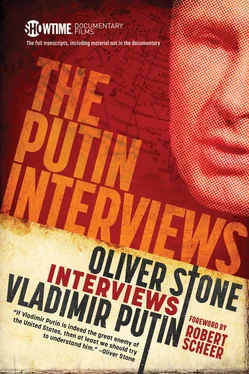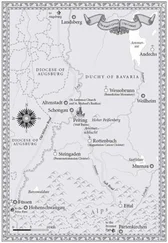VP:Yes, and that’s exactly what I’m doing, I’m saying these things.
OS:Well, I wish there was more of it. So right now you’re waiting it out, and at the same time, you know, Mr. Trump has called for, on more than one occasion, for another massive US military build-up, in both nuclear and conventional arms, which makes no sense to me. How can America spend more than it’s already spending? But that’s what they’re talking about—increasing the military budget.
VP:I think we talked about that. The US spends more on defense than all the other countries in the world combined spend on their defense—more than six hundred billion US dollars. [167] Claim: “the US spends more on defense than all the other countries in the world combined spends on their defense—more than six hundred billion US dollars.” See, “Here’s how US defense spending stacks up against the rest of the world,” Ibid.
OS:Aren’t you worried that Mr. Trump, in calling for more, is infantile in his demands?
VP:We’re always concerned about any build-up in military expenditure of other countries, including the United States. We always have to analyze how this is going to impact our own security. But I think the American taxpayers have to think about that as well. How efficient are these expenses going to be? How it’s going to correlate with the current economic situation, because apart from military expenditure, there are other things to spend money on, like healthcare, education, pension systems.
There are many other issues—social issues to address, servicing the public debt which is almost 20 trillion US dollars. All those are issues that have to be handled. But the military is always discontent with the money it gets from the state. It always wants more. Trust me, we’ve got the same disputes between the civilian departments, the defense ministry, the finance ministry. This is the same everywhere.
OS:Do you have any hopes of a meeting sometime in the coming months with Mr. Trump or not?
VP:I think we’re going to meet some time. But we’re not trying to rush. The American administration is still being built and they are still drafting their position on the key issues. We understand full well that, together with his allies and his partners, President Trump is going to come up with his own position on the most important issues. He’ll have to work with the intelligence services, with the State Department, the military. He’ll have to work with the Republicans and with the Democrats and will have to consider. There are many elements to consider. So once the administration is ready to get down to some practical work, we’re going to respond.
OS:And how is he going to work with the intelligence agencies if the intelligence agencies are telling him that Russia hacked the election? It’s a dead end.
VP:No, it’s not a dead end. This is a question of human personnel.
OS:If Mr. Trump wanted to declassify or see the files on Ukraine—all the files—all the files on Syria and see the origins of these problems. Is there a possibility of that, that he might change some of his thinking?
VP:I think that is possible. But I’d like to reiterate, he’ll have to work in a certain framework. We’re adults and we understand what’s happening. Well, I do hope that once he has grasped the crux of the matter, he’ll come up with a vision of his own of what is happening.
OS:I hope you’re right.
VP:So do I. I do hope that we’ll find some common ground and reach mutual understanding.
OS:When is the next G20 meeting?
VP:I think in summer—in July.
OS:In July, so that would be the first you see each other, if you did?
VP:Yes, maybe.
OS:I gather you’ve had two phone calls with him?
VP:Yes. One telephone conversation took place before his inauguration, and the other one afterwards.
OS:And I gather some of the talk may have been about terrorism.
VP:We’ve talked about the fight against terrorism, we’ve touched upon North Korea, we’ve talked about nuclear disarmament. And we’ve touched upon Ukraine. And we certainly agreed that we’ve got to open a new page in Russia-US relations.
OS:On terrorism, it seems like again the intelligence agencies of the United States will not agree with the Russian position on terrorism. It seems like, fundamentally, the US intelligence has been politicized.
VP:You know, indeed, with the Obama administration we almost reached an agreement on working jointly in Syria.
OS:Almost?
VP:Yes, almost. We had talked about coordinating the matters related to the security and safety of our aircraft flying over, but unfortunately this is all that we did. We didn’t go further. We were willing to agree on joint activity, that would have implied designating on the ground, in accordance with our data and their data, the location of terrorist groups. I believe that we should have designated targets to fight against. And we also would have agreed on the strikes to be performed jointly. And we were very close to achieving this agreement. But at the last moment, I think due to some political reasons, our American partners abandoned this project.
OS:Well, Mr. Trump has talked very tough about Iran. And this is an example, fundamentally, if many Americans believe in the official policy that Iran is the number one terrorist organization in the world, you, Mr. Putin would not agree. And many people would say that the number one terrorist organization is the Saudi Arabian government. Now, that becomes a Shia/Sunni split. So many Americans are fighting pro-Sunni and anti-Shia and many other people feel that the source of the problems is Sunni and the allegiances should change. But Saudi Arabia and Israel have very solid American support and, unless that changes, there is a basic, fundamental contradiction in this and in the Russian and American positions.
VP:You know, there is no world religion that is a source of evil. Islam has many denominations, many streams, and the main movements are the Shia and the Sunni. Indeed we see there are some deep divides between these two factions, but I think this divide will sooner or later have to be bridged. We’ve got very good friendly relations with all Islamic states. Moreover, we are an observer at the Organization of the Islamic Conference since 2003. Because around 15 percent of Russian citizens profess Islam—they’re Muslim. And I once attended the summit of the Organization of the Islamic Conference. We know that our attempts at helping Syria, supporting its legitimate government, some hope will lead to a contradiction, to disputes with the Sunni. But this is not what is happening. I can go in greater detail. As far as the difference of approach to the Iranian nuclear issue is concerned, I can say that, in order to understand if there is any difference in our approaches, we need to talk substance with the US at the State Department level, or at the intelligence services level, and also at the National Security Council level. Because public statements are not sufficient either from our side, or from the American side. We want to hear the arguments that the American side can produce for us, not the arguments that can be voiced publicly. We want to have a constructive professional dialogue with them. We want our position to be heard as well. We managed to arrive at many agreements on these matters with the previous administration. And I do not rule out that with the new administration, we are also going to be able to find common ground. To that end, we need a concrete dialogue on the substance of the matter.
Читать дальше












